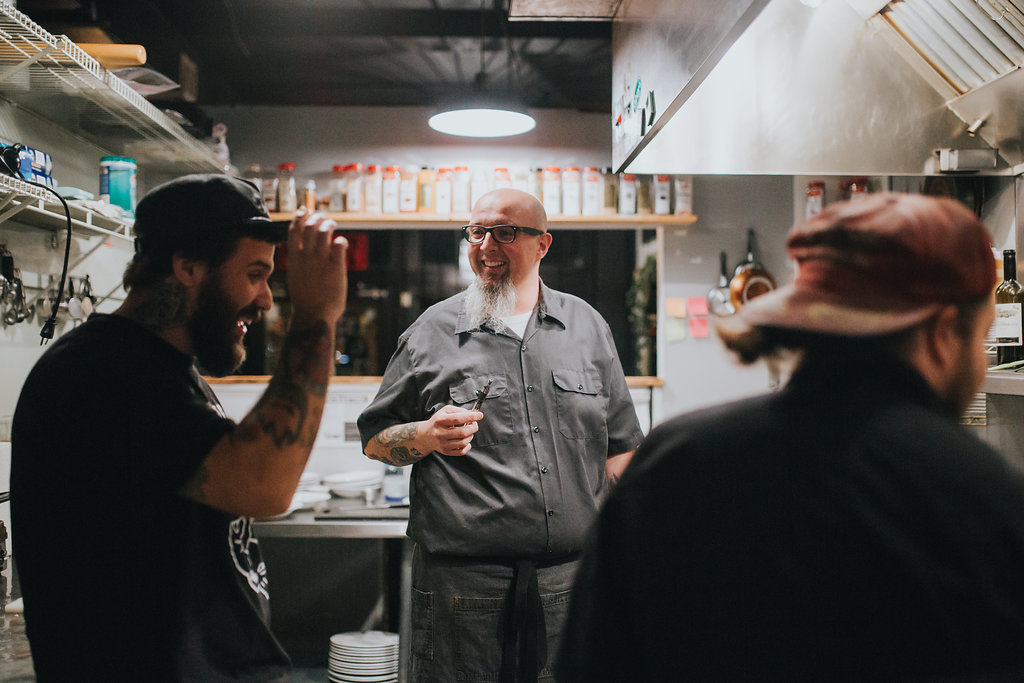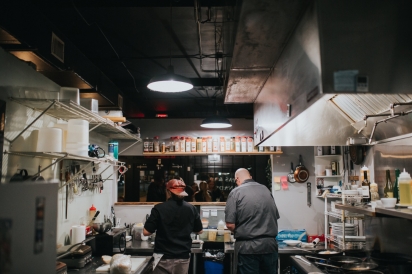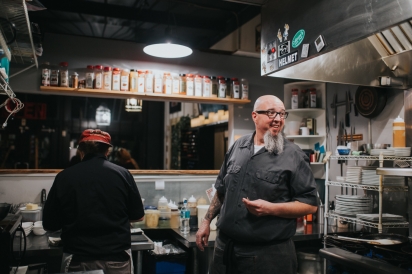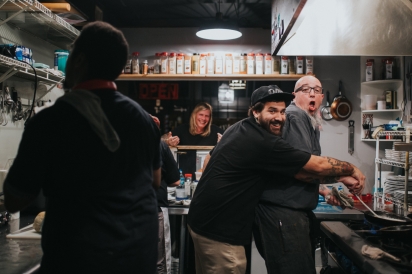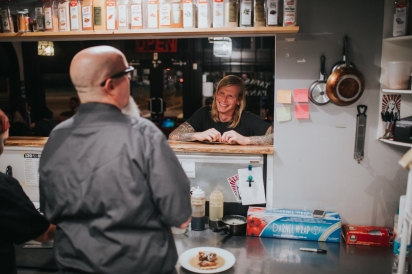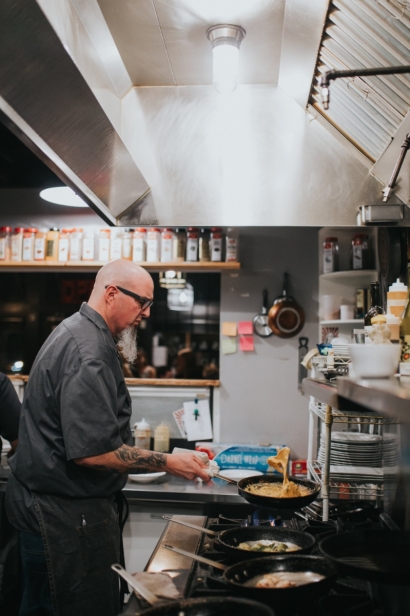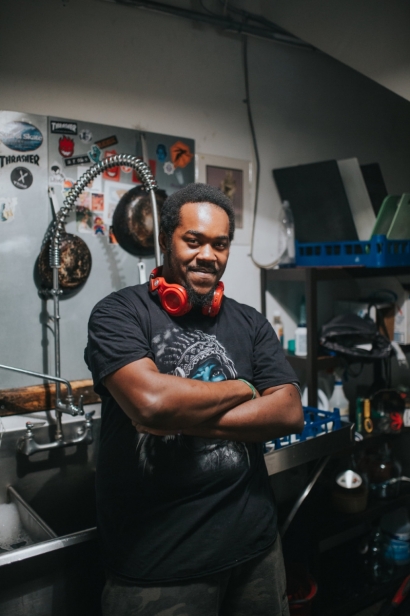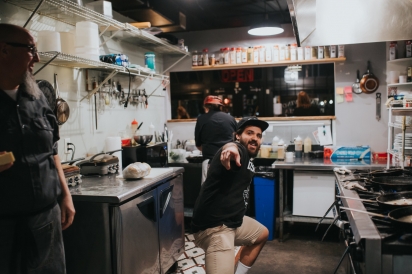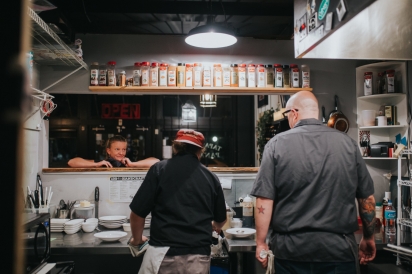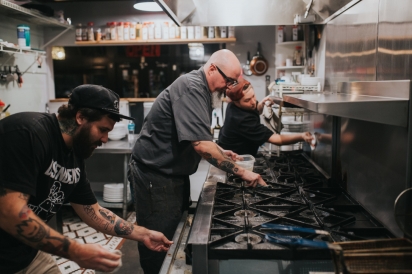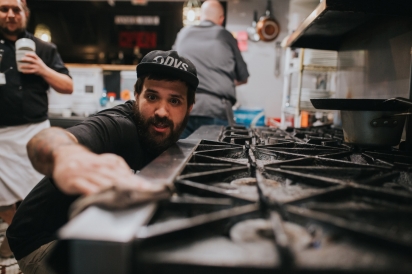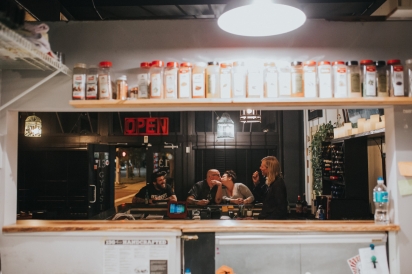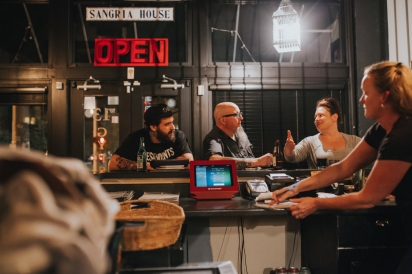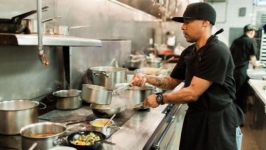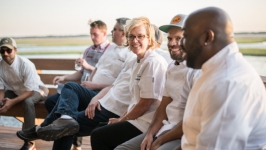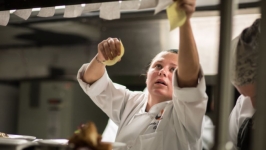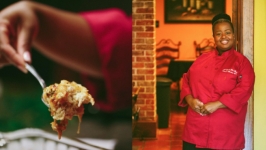Beyond the Brigade: Redefining Kitchen Culture
When you sit down for a meal in a nice restaurant, what you experience is part of a meticulous, well-rehearsed dance. Silverware, polished glasses and folded linens set the stage. Servers greet you, pour water and offer you another beverage, before gracefully rejoining an intricate ballet of foodrunners, hosts and bussers. The process is practiced and carefully refined to heighten one's experience of the food being served from the kitchen.
Once the server walks away, however, do you ever stop to wonder what's happening simultaneously behind a restaurant's kitchen door?
If you’ve read Anthony Bourdain’s Kitchen Confidential, a memoir tell-all of the food service industry or watched any popular series featuring Chef Gordon Ramsay, you may have a portrait of professional kitchens as the dark and dysfunctional underbelly of restaurant life, characterized by drug-abuse, tyranny and military-like order. And while popular portrayals of the industry may be fun to read or watch, they certainly don't reflect the reality of all professional kitchens, especially many of those in our region.
On the other hand, some of the story they tell may not be entirely off base.
According to the Bureau of Labor Statistics, restaurant workers have the highest rate of substance abuse disorder, with more food service workers reporting the use of illicit substances than any industry in the country. What's more, studies from the federal Substance Abuse and Mental Health Services Administration in the last decade have revealed that food service employees report some of the highest rates of depression amongst workers aged 18-64.
Food service isn't typically a profession that many people perceive as a “high-pressure job.”
Sans the obvious need for food handling safety, generally there aren't any life or death decisions being made daily. There are no diplomatic snafus that might compromise world peace and markets won't crumble if a soufflé goes belly-up. But still, the data persists and begs the question: why has a kitchen career become such a stressful occupation?
Social media and a relentless stream of public online reviews are one factor contributing to this trend. In the digital age, negative restaurant criticisms can swiftly tarnish the reputation of an establishment, and with more consumers instagramming, tweeting and snap-chatting their experiences than ever before, the demand for perfected performance is ever-looming.
Kitchen work is also more physically demanding than most people imagine. It often requires long hours on your feet in tight quarters, the skill to manage potentially dangerous equipment in a fast-paced environment and the flawless ability to work in concert with a team.
Additionally, there is often an unspoken expectation of mental toughness. If you have a problem, you fix it. If you are struggling, you suck it up. And, historically, this has been the way a kitchen worker finds their “chops,” builds character and earns respect amongst their peers.
If this regimented approach to kitchen life sounds slightly reminiscent of a military-like structure, it's because it is. Around the turn of the 20th century in France, Georges Auguste Escoffier developed a hierarchal system of kitchen management, referred to as Brigade de Cuisine, and for over a century, it's been revered as the gold standard for developing a world-class kitchen team. In French, the word chef literally means chief, and he or she who maintains this role sets the tone for a system of organization that divides tasks according to rank and file.
But not every restaurant and chef still feels as though this is the only way to get business done. In fact, there are many local restaurateurs and chefs in Northeast Florida who are consciously working to make their kitchens a more supportive place to be, despite the fact that they themselves may have cut their teeth in an intensely competitive environment.
“When I started, it was ruthless in the kitchen. You had to be able to handle being screamed at. But you can’t talk to employees like that anymore. I like to think my kitchens are less stressful,” says Jamey Evoniuk, Executive Chef at the Candy Apple Café. Having spent years under a brigade-style structure, Evoniuk is determined to do things differently. Instead of pinpointing the pressures of kitchen service on individuals, he focuses on procedures and plans that help keep the action in his kitchen flowing. “So much is out of our control – the volume of customers, the time they all come in to eat, what each person orders - I try to be super-organized, even if it seems to be chaotic.”
Chef Howard Kirk of 13 Gypsies is another advocate for kinder kitchens. When he first opened his small but bustling restaurant on Stockton Street, he intentionally sought to foster a different kind of culture. Having had his fill of the high-pressure world of larger kitchens, Kirk set out to do something different with his own business. “When I opened this place I had every intention of it being a one-man kitchen. I never expected to have any help back there,” he says. “But when I decided I needed help to keep up, I made the choice that I didn’t want to run it brigade style, I wanted it to be fun.”
For Chef Kirk, “fun” in the kitchen means the ability to joke around, taking the work seriously, without taking yourself too seriously, an uncommon ethos in more structured environments. “[In other restaurants] service hours are service hours and you can joke around a little bit, but you really need to keep an ear out for the expo (expediter) and what he’s saying. You better acknowledge the fact that you heard him and you better have your timing right.”
At 13 Gypsies, Kirk has thrown many of the conventions of modern restaurants out the window. Dishes are made to order and guests receive them as they are completed. Chefs have their duties and perform them with a dedication to high-quality food. But they also enjoy themselves and work without excessive undue stress.
Evoniuk explains, “In restaurants, you take business when you can get it, and sometimes everyone comes all at the same time. To make money, you need the volume because margins are so slim. On top of that, customer expectations are high and people are tough to please. So when someone makes a mistake in the middle of a rush, they need to be held accountable, but maybe not while everyone is scrambling to fix the error.” At that point, “it’s time to take a deep breath, step back and figure out how to deal with it without shouting or berating someone.”
Evoniuk looks for people who can keep up with all the moving parts associated with a typical restaurant shift. Cross-training among his staff helps build the depth of skills necessary while reducing some of the monotony of repetitious work day after day.
“The ability to teach the staff is very important, and I want the various stations to know how to make all of the recipes. The staff responds to that,” Evoniuk says. He recognizes the need for flexibility and tries to accommodate staff needs, so they want to come to work each day and perform. “It’s important to be transparent, to make sure everyone knows what is expected of them and there are no gray areas. I want to create a culture where the employees feel like they have ownership and what they say is important.”
Still, even in kinder environments where on-the-job structures are being reconfigured during service hours, industry pitfalls remain. Listening to Kirk describe life in the kitchen, one immediately understands how the waters between work and life get muddied, and how food service employees continue to be susceptible to national trends. “That’s the lifestyle - you come in, you bang out service and then as soon as the adrenaline rush is over you start to crash,” Kirk explains. “So, you go out to the bar, start drinking and making fun of everything that happened that day, then you pass out, wake up with a hangover and do it all over again.”
Hospitality work is no 9 to 5 job, and many in the industry prefer it that way. Perhaps the conditions for an alternative lifestyle will always exist. What may evolve, however, are the systems that create some of the precursors for industry challenges. Employers will neverbe able to change what individuals choose to do on their own time, but a shift toward supporting employees in a collaborative environment is a good starting point – a positive move in the direction of work-life balance for all.


